35 results
High school statistics resources for SMART Notebook and for International Baccalaureate
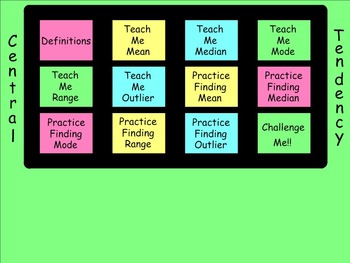
How I Teach Finding Mean, Median, Mode, Range, and Outliers
This is a 70 page Smartboard file covering Central Tendency. The students are given definitions for Mean, Median, Mode, Range, and Outlier. They are also taught how to find each when given a list of numbers. There are plenty of practice pages for each and all include answers. There is also a section of more challenging problems at the end. All pages are linked to a central homepage so that no matter where you are in the file it will always be easy to navigate around.
Subjects:
Grades:
6th - 9th
Types:
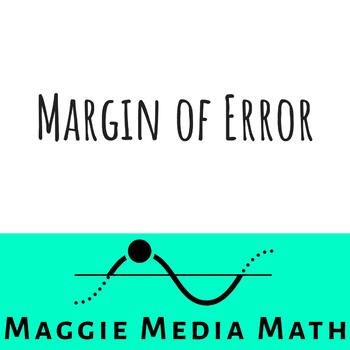
Margin of Error Lesson | SMART Board File
The file attached is an interactive SMART Board file that focuses on the topic of Margin of Error. Use this resource to help you navigate through the Common Core Algebra 2 Statistics unit. This lesson adheres to the Common Core State Standards.Structure of lesson: Aim (Objective), Do Now (Warm up), Development (Definitions/ Diagrams), Practice Questions (including Regents Questions), Summary Questions (which can be used as an Exit Ticket).Material Covered: All three formulas and when to use them
Subjects:
Grades:
9th - 12th
Types:
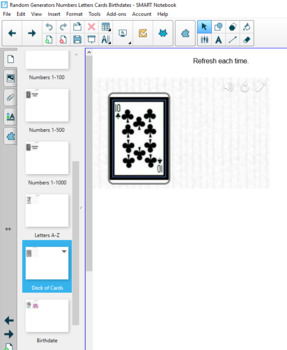
Random Number Letter Deck of Cards Birthday Generator SMART 18 Flash Replacement
If your district has upgraded to Windows 10 and SMART 18, then many of your highly-used flash components will no longer work. I have been recreating them in the new SMART 18. These Random Generators (Numbers 1-36, Numbers 1-100, Numbers 1-500, Numbers 1-1000, Letters A-Z, Playing Card from a Deck of Cards, & Birthdate) are comparable to what was previously available in SMART, though they operate differently.Random Generators SMART 18 Flash Replacement by Brian Tillmann is licensed under a Cr
Subjects:
Grades:
K - 12th, Staff
Types:
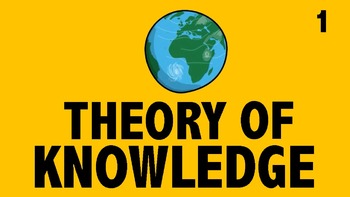
IB Theory of Knowledge - What Knowledge is important?
This exercise ask ToK students to work in groups to design their own IB curriculum. What subjects should be mandatory? What subjects should be optional? Why? All of these prompts are used to help guide students to produce a "new" IBDP curriculum. Groups share their conclusions with the class. The teacher can then discuss with the class the various choices. Why did you choose to make that subject compulsory? Which knowledge is important? What if we disagree about which knowledge is important? The
Grades:
11th - 12th
Types:
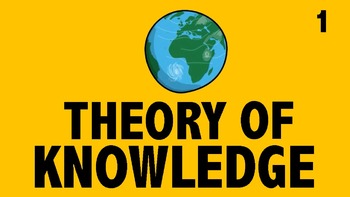
IB Theory of Knowledge - Prohibit, Tolerate, Respect Game
A fun way to start teaching Ethics in ToK. Students are given index cards that have the names of various ethically controversial behaviour on them, for example arranged marriages, cloning, homosexuality etc. Students work in groups to place the cards in one of 3 categories - behaviour that is so offensive, it should be prohibited, behaviour that they feel is perhaps is unethical but should be tolerated, and behaviour that is acceptable and should be respected. When the groups are done with their
Grades:
11th - 12th
Types:
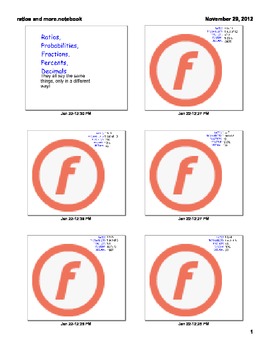
SMARTBOARD lesson on ratios, fractions, percentages, and more
This smartboard lesson showcases how ratios, fractions, decimals, probabilities, and percentages are all similar ways of looking at the same thing. Each page has a spinner with a different amount of colored slices on it. As you go from many slices to fewer slices, the chance of correctly predicting what color comes up gets much better.
Have students 'bet' classroom rewards like tickets or candy to see who can correctly guess the most colors as you go through the lesson.
Subjects:
Grades:
3rd - 12th, Adult Education
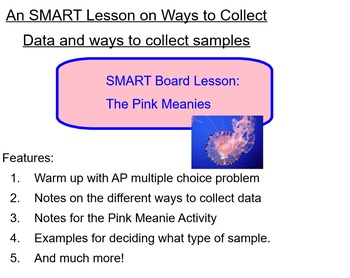
Statistics (SMART Board): Pink Meanies (Ways to Collect Samples)
This SMART lesson includes the following:
- A warm up with an AP multiple choice question
- Notes on different ways to collect data
- An activity on a census
- Notes for the Pink Meanie Investigative Task
- Examples of different types of sampling methods
- A closing the includes a card sort for the different types of sampling methods.
Subjects:
Grades:
11th - 12th, Higher Education
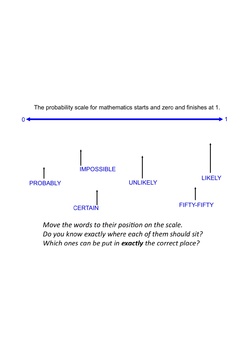
Introduction to Probability: Smartboard Lesson
This lesson focuses on the difference between everyday language and the specific value of various probabilities. The lesson starts with a game that my students absolutely love. We play several rounds of the game, changing the rules as we go to explore some inherent concepts of basic probability. There are a couple of slides where students have the opportunity to come to the board and move the words around. This can lead to some important discussions about the use of the given vocabulary. The
Subjects:
Grades:
5th - 9th
Types:
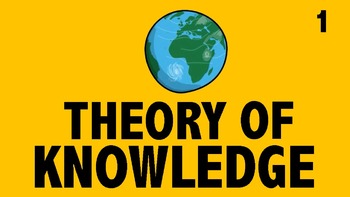
IB Theory of Knowledge - Justifying Knowledge Claims
A series of SmartBoard Notebook slides that are discussion prompts that could be done as small group discussions or as a whole class. The slides take students through the process of justifying knowledge claims. What makes a claim believable? Why do we believe some claims and not others? How do we discover if a claim is false? Easily convertible to PDF format if you choose to use this as a handout.
Grades:
11th - 12th
Types:

GRAPHING CALCULATOR SKILLS FOR ALGEBRA
This game-like approach to learning how to use the graphing calculator for Algebra skills was a big hit with my students. It served as a great resource to review Statistic concepts such as determining mean, standard deviation, correlation coefficient, interquartile range, along with creating linear, quadratic, and exponential equations from a table on the graphing calculator.
Subjects:
Grades:
8th - 10th
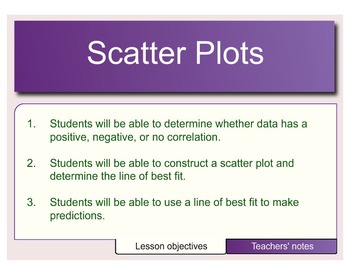
Scatter Plots
This lesson explores creating and analyzing scatter plots by determining the correlation: positive, negative, or no correlation. It also incorporates making predictions based on the line of best fit.
Negative Correlation, Data Display, Scatter Plot, Positive Correlation, Line of Best Fit, Best Fit Line, Correlation, No Correlation, Independent Variable, Dependent Variable
Subjects:
Grades:
7th - 9th
Types:
CCSS:
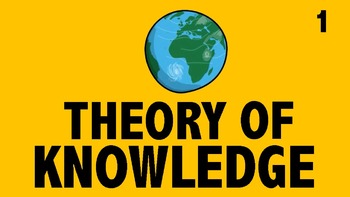
IB Theory of Knowledge - The Strengths and Weaknesses of Induction
A 3 page SmartBoard Notebook file that contains discussion prompts about induction as a tool of logic and reasoning. The first page asks students to work in groups to identify generalizations that they routinely use in their IB subject classes and to assign some importance to them. Then the second and third slides move to a discussion of why we use inductive thinking (generalizations) and what makes a good (or not so good) generalization. All slides are easily convertible to PDF format if you pr
Grades:
11th - 12th
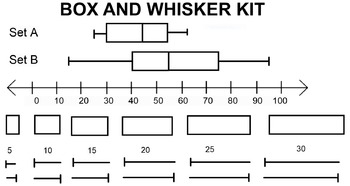
Box and Whisker Plot Construction Kit
This is a Smart Notebook file which can be used to create your own box and whisker plots easily by dragging and dropping the parts together. Includes 4 sets of problems with solution pages. You can use this to create your own box and whisker plot lesson or worksheets.
Subjects:
Grades:
7th - 9th
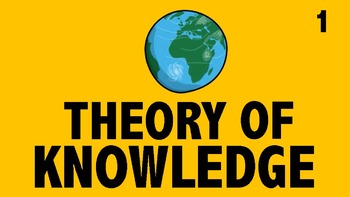
IB Theory of Knowledge - Degrees of Certainty
An easy, accessible way to start your ToK course. Students view the SmartBoard Notebook file and place the various statements, all of which begin with "I know..." on a "Certainty Graph" ranging from 100% certain to highly doubtful. Students share their choices and must defend them to the class. Students are then asked to discuss what criteria they apply to a knowledge claim to decide its certainty. This could be done as a writing assignment too.Students can do this activity in groups or individu
Grades:
11th - 12th
Types:
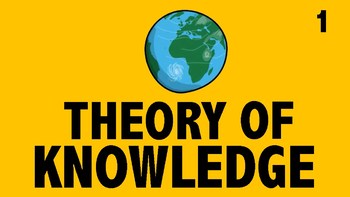
IB Theory of Knowledge - History and Inventions
A single-page SmartBoard Notebook file that contains 3 separate discussion prompts asking students to think about, identify and justify their "most historically significant" invention. This could be done as a whole class or in small groups. Students are then asked to discuss the predictability of history vs. the predictability in other natural and human sciences. The file is easily convertible to PDF format if you choose to use it as a hard-copy handout.
Grades:
11th - 12th
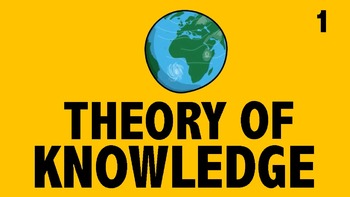
IB Theory of Knowledge - Perception and Culture
A series of SmartBoard Notebook slides with discussion prompts that ask students to consider whether or not their life experience affects the way they view and perceive the world. This discussion can be preceded or followed by an explanation of the role of sensation and interpretation. The prompts could also be used as a ToK in-class writing assignment. The file is easily convertible to PDF format if you choose to use it as a handout.
Grades:
11th - 12th
Types:
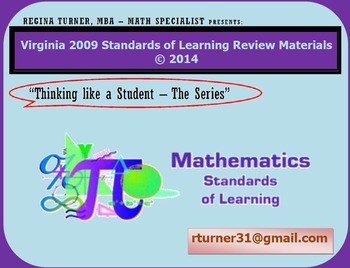
Virginia SOL Review TEIs Math Grade 8 (2009 SOLs)
Virginia SOL Review TEIs Math Grade 8
Technology Enhanced Items
Subjects:
Grades:
6th - 9th
Types:
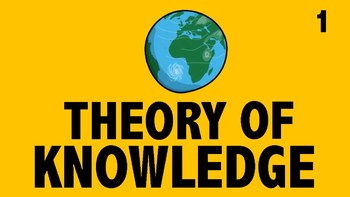
IB Theory of Knowledge - The Historical Method
A three-page SmartBoard Notebook file that contains discussion prompts asking students to discuss why certain events are considered historically significant and others are not. What makes history? This exercise could be done in small groups or as a whole class. Any of the prompts could be used as a writing assignment as well. The file is easily convertible to a PDF if you choose to use it as a hard-copy handout.
Grades:
11th - 12th

IB Theory of Knowledge - The Importance of Reasoning
A two page SmartBoard Notebook file that contains discussion prompts for students wherein they are asked to talk about why logic and reasoning are important tools. This can lead to a discussion of the strengths and weaknesses of reasoning as a Way of Knowing. Files are easily convertible to PDF format if you choose to use them as handouts instead. Discussion prompts can also be used as writing assignments or as group work if you wish.
Grades:
11th - 12th

1.1 Inferential and Descriptive Statistics
Smart Board Lesson for Bluman "Elementary Statistics) 8th edition
Subjects:
Grades:
9th - 12th
Types:
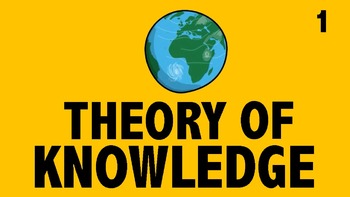
IB Theory of Knowledge - Where does your conscience come from?
A simple two-page SmartBoard Notebook file that contains discussion prompts for students as part of their unit on ethics. The discussion can be done in groups or as a whole class. It could even be given as a written assignment. Easily convertible to PDF for photocopying, if you choose to use it as a handout.
Grades:
11th - 12th
Types:

Always, Sometimes, Never Sets Smart Notebook
This is a SmartNotebook document for notes on Always, Sometimes, Never Sets. It is editable.
Subjects:
Grades:
7th - 11th
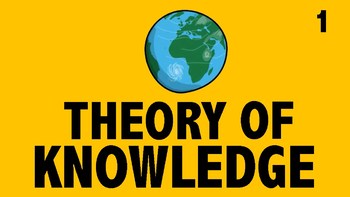
IB Theory of Knowledge - Knowing the Past
A SmartBoard Notebook file that contains a series of quotes about the study of history as well as two photos from the Russian Revolution, one with Trotsky next to Lenin, the other with Trotsky airbrushed out after Stalin's rise to power. These are then used to introduce the concept of ambiguity of knowledge gained from the past. How can we be sure we know the past? Students can then be lead to the concepts of repetition and reliability of historical evidence to produce certainty. The file is eas
Grades:
11th - 12th
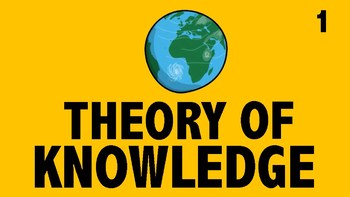
IB Theory of Knowledge - The Benefits and Drawbacks of Hindsight
A SmartBoard Notebook file that contains quotes from Adolf Hitler and Louis XVI of France to introduce the concept of how historians cannot directly observe their data and thus must rely on memory and logic, mainly of other people. The quotes can be used as discussion prompts or as writing assignments. The file is easily convertible to a PDF format if you choose to use it as a handout.
Grades:
11th - 12th
Showing 1-24 of 35 results

